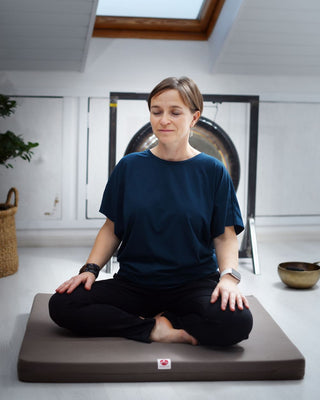Mindfulness is one of the most powerful methods for reducing stress, gaining popularity due to its scientifically proven effectiveness. Developed and popularized by Jon Kabat-Zinn, the creator of the Mindfulness-Based Stress Reduction (MBSR) program, mindfulness is defined as “the awareness that arises by paying attention, on purpose, in the present moment, and nonjudgmentally.”
What Does Science Say About Mindfulness and Stress Reduction?
Jon Kabat-Zinn’s studies and other research in the field have demonstrated numerous benefits of mindfulness practice for stress reduction. Key findings include:
- Reduction of physical and psychological stress symptoms: Mindfulness practitioners report lower levels of anxiety, depression, and chronic fatigue. Studies show that MBSR programs can reduce cortisol (the stress hormone) levels and improve the body’s response to stressful situations.
- Enhanced immune function: Mindfulness practices contribute to increased resilience against illnesses.
- Improved mental clarity: Those who practice mindfulness make better decisions and manage their time and resources more effectively.
- Promotion of deep relaxation: Techniques such as mindful meditation and body scans induce a state of calm and inner balance.
How to Apply Mindfulness in Daily Life
Although the MBSR program has a formal structure, mindfulness practices can easily be adapted to fit into everyday routines. Here are some recommendations:
1. Practice Conscious Breathing (3-5 Minutes a Day)
- Pause whatever you’re doing and focus on your breathing.
- Observe how the air enters and leaves your body without attempting to change its rhythm.
- This simple practice can be used during tense moments to regain calm and clarity.
2. Try a Body Scan Practice
- Dedicate 5-10 minutes a day to connect with your body.
- Close your eyes and gradually bring your attention to different parts of your body, starting from your toes and moving to the top of your head.
- Observe any sensations, tension, or discomfort without trying to change anything.
3. Be Present During Daily Activities
- Instead of performing routine tasks on autopilot, try to be fully aware of them.
- For example, when washing dishes, notice the sensation of the water, the texture of the dish, and the movement of your hands.
- This simple shift can transform mundane tasks into moments of relaxation.
4. Practice Daily Gratitude
- Each evening before bed, write down three things you’re grateful for.
- This practice helps shift your mental focus from negative to positive, reducing stress.
5. Use the “STOP” Technique to Respond to Stress
This quick method, derived from MBSR, is a way to break the stress cycle:
- S - Stop: Pause for a moment.
- T - Take a breath: Take a few deep breaths.
- O - Observe: Notice what’s happening inside you (thoughts, emotions, bodily sensations).
- P - Proceed: Resume your activity with greater clarity and calm.
Mindfulness as a Way of Life
To make mindfulness effective, it’s important to practice regularly. You don’t need to dedicate hours, but a few minutes each day can have a significant impact on your well-being. In the long term, mindfulness can improve not only your physical and mental health but also your personal relationships and professional performance.
Conclusion
Mindfulness is more than a technique; it’s a way of living. Jon Kabat-Zinn’s teachings remind us that, regardless of external circumstances, we can cultivate calm, clarity, and resilience through the simple art of being present. By integrating these practices into daily life, we can transform stress from a destructive force into an opportunity for personal growth and self-discovery.
“Wherever you go, there you are.” – Jon Kabat-Zinn

